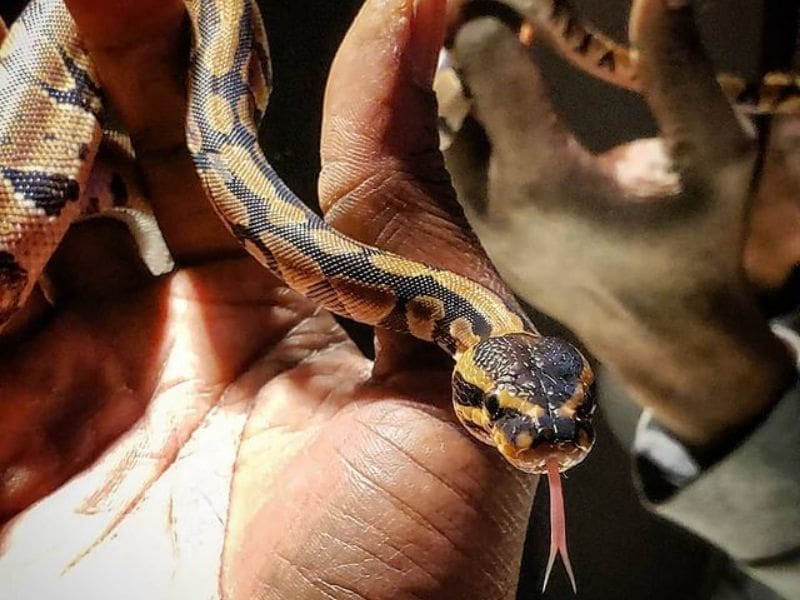Although ball pythons, like other snake species, are identified broadly as predators, still, in the wild and in captivity they also exist as prey. Owing to their friendly demeanor and small stature, ball pythons are more exposed to prey attacks. Because of that, they rely on a range of defence mechanisms for their safety and protection.
Do Ball Pythons Hiss?

Yes, ball pythons do also release the famous ‘sss’ sound, a common feature of all snake species. As an inexperienced snake pet owner, you should expect this behavior which many people find strange and frightening.
The sound of hissing is a result of inhaling a lot of air which is then strongly exhaled. The creation of the ‘sss’ sound is possible primarily because of the input of the glottis, an organ situated in the middle of the mouth and lungs. The glottis constitutes part of the larynx, known for its harboring of equally useful vocal cords.
Air flowing through your pet’s vocal cords manufacturers a rhythmic vibration that in turn creates the hissing sound. A fast-moving wiggling of the vocal cords translates into a louder sound.
When ball pythons are claiming their territories or detect territorial threats, they will inhale and exhale as much air as possible. The input of the tongue makes maneuvering the air to hiss easily possible. For humans, manipulating the sound or vibration emanating from the voice box is easier with the working combination of the tongue and lips.
Why is My Ball Python Hissing?
Hissing is just one of the many behavioral cues your reptilian friend employs to communicate with you and register a stern warning to any approaching threat or predator. Other cues you should always be on the lookout for include loss of appetite, frequent rubbing of the nose against different surfaces, and aggression displayed via a nibble or strike.
Subsequently, see below for reasons why your ball python may be hissing.
To intimidate predators
The main reason why your ball python may be making the hissing noise is that it feels in danger of an attack by predators such as humans, hyenas, raptors, large frogs, and wild dogs. Remember, ball pythons are disadvantaged to intimidate and protect themselves from predators since their bites are not lethal and they are reasonably sized.
Ball pythons resort to their defensive mechanism which includes releasing the hissing noise, to hopefully scare away predators and avoid a fight. Unlike ball pythons, bigger snakes are venomous and capable of fatally biting and crushing threatening predators.
To undertake territorial marking and guarding
A ball python hissing can also be an indication that it thinks its territory, den, or hiding spot is under threat from being invaded and occupied by other predators. Even at home, there is a high chance you have a favorite spot or sitting location which when occupied by another person may be unsettling for you.
Ball pythons are capable of staying in hiding and hissing heavily to scare predators into wrongly believing they are facing bigger and lethal snakes.
It feels uncomfortable
If you have just introduced your reptilian friend to its new enclosure or habitat, the hissing noise is normal as it makes an effort to detect and familiarize itself with the new setting. Once your snake pet has acclimatized to the new home but continues hissing, then there are other causes of stress. For instance, a ball python may hiss if its enclosure has a bad substrate that upsets its skin.
What Does it Mean When a Ball python Hisses at Me?
As a keeper of a ball python, your reptilian friend will not hiss at you by accident. The hissing is an action designed to alert you that it is feeling stressed, unsafe, and uncomfortable. A ball python with stress has a weaker immune system and can trigger a hunger strike.
The possible explanations to a ball python hissing at you may include:
It needs to be left alone to shed
Before, during, after shedding, the snake pet does not desire any disturbance since it needs to concentrate on that stressful and delicate process. During shedding, the snake may not also easily recognize you since its eyes are usually hazy.
It is scared of your presence
For instance, if you are trying to hold a ball python and it hisses at you, tries to evade you, or assumes a ball shape, the communication is that it is fearful of your handling and socialization at that particular time. The hissing is done to scare you into not endangering the snake pet, particularly if it is resting after eating to not regurgitate.
The enclosure is uninhabitable
Where your ball python lives must be well-stocked with stuff and the right conditions allowing conducive living. An enclosure that has extreme moisture and temperature level, and lacks objects to be climbed, useful substrate, and hiding spots is a recipe for stressing a ball python to hiss. Other stressors of ball pythons include a high traffic location and other pets such as dogs.
Read more: Ball Python Heating Guide: Does the Snake Need a Heating Lamp?
Lack of the right handling and socialization routine
Because of their instincts, young ball pythons are always on the lookout for threats. Naturally, snakes are distrustful and get intimidated by humans and other predators effortlessly. Poorly handled and socialized snakes will hiss at you and even strike you since you are not considered a friend.
It is startled
Startling your ball python is easy just by making hurried movements towards the snake. A surprised royal python first activates its defensive mechanism of hissing before eventually realizing you are not a threat.
What To Do If The Snake Won’t Stop Hissing
When a snake will not stop hissing randomly or hissing suddenly, here is what you can do to encourage the end of the behavior.
Avoid disturbing the snake
You should avoid disturbing your snake pet, especially during shedding and after it has recently eaten. It is recommended by snake keeping and breeding experts that you leave your snake to rest at least for a day or three days after eating for it not to hiss at you for fear of regurgitation.
You should not house snakes together
Being a territorial and anti-social animal, avoid housing ball pythons together, unless you do not mind exposure to recurrent hissing noises as they fight over who can be in control of the others.
Do not over-handle/socialize the snake
Snakes are not social creatures by nature, they need their space for hiding, resting, and relaxation. Implementing appropriate socialization and handling routine can help stop the making of the hissing noise.
A wild-caught snake should be released
It is challenging and risky to keep a wild-caught snake as a pet since it often feels more threatened by the presence of predators, including humans. If the snake was wild-caught, release it for it to go back where it belongs.
A snake purchased from a reputable breeder will be more tolerant of your presence and receptive to handling and socialization regime.
Avoid surprising the snake
When moving towards a snake, do that slowly so that it has ample time to recognize you are not a threat and avoid going into an alert and defensive mode, which yields the hissing sound.
In Conclusion
If your ball python, or other types of snake, is hissing suddenly or randomly, often it may be because it has detected predators and feels in danger. As well, the hissing of a snake may be because of a disease or illness. An ill snake will want to strike and make the ‘sss’ sound at you even if it recognizes you as the keeper.
Always check for signs of illness such as hissing, loss of appetite, stargazing, mouth and nose discharge, an unusual appearance of scales, loss of weight, and lethargy. A vet can help if you are dealing with an illness. If your snake is not ill, grant it its free space to relax and enjoy. Ball pythons like to spend most of their time in hideouts.
READ NEXT: Why Do Ball Pythons Yawn? Meaning + What to Do

